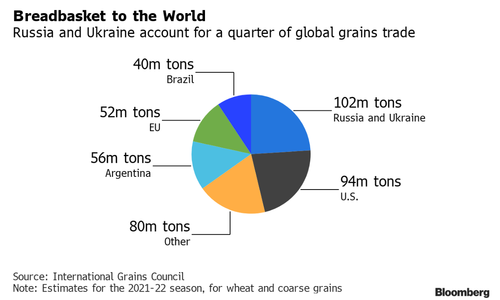Top Biden Economist Says Farmers To Increase Crop Production On “Price Signals” To Avert Food Shortage
The White House’s chief economist told reporters at a daily press briefing on Monday that American farmers will respond to “price signals” to increase crop production to mitigate food shortages worldwide following Russia’s invasion of Ukraine.
A reporter asked Cecilia Rouse, the chair of President Joe Biden’s Council of Economic Advisers, about the White House’s plan to deal with food shortages when it comes to wheat.
Rouse said, “well, first we are a net exporter of many food commodities, and farmers respond to price signals, and so with the price of food rising, they will be responding by making additional plantings and try to take advantage of increase pricing.”
She added: “The market will work as the market will work.”
Council of Economic Advisers Chair Cecilia Rouse is asked how the White House is planning on dealing with food shortages. pic.twitter.com/MpJUghx63R
— The Post Millennial (@TPostMillennial) March 28, 2022
The war in Ukraine has disrupted the global food supply. Russia and Ukraine account for more than a quarter of the international wheat trade, about a fifth of corn, and 12% of all calories traded globally.
We’ve outlined the emerging market countries that will first feel the brunt of food price shocks and shortages. Bloomberg data shows the most reliant countries on Ukraine wheat, including Egypt, Indonesia, Bangladesh, Pakistan, and Turkey.
The UN’s Food and Agriculture Organization forecasts that global food prices could soar another 8%-20%.
The issue with Rouse’s response is that the costs of plantings have skyrocketed. Fertilizer and diesel prices are at record highs, and this may deter some farmers from additional plantings or even switching crops that require less fertilizer. The farmers who decide to plant wheat may spread less fertilizer on fields, which could impact harvest yields later this year.
Bread, cooking oils, and meat prices have surged. Countries are now adopting food protectionism (see: Argentina) by limiting or ceasing exports of farm goods to mitigate domestic shortages.
Last week, President Biden warned that there could be global food shortages:
“We did talk about food shortages. And it’s going to be real. The price of these sanctions is not just imposed upon Russia, it’s imposed upon an awful lot of countries as well, including European countries and our country as well,” Biden said at a presser in Brussels.
As we’ve previously noted, the “”Media Isn’t Warning You” That US Careening Towards Food Crisis,” maybe the White House should refocus its efforts on securing domestic supplies first before exporting farm goods abroad. The last thing Biden needs before midterms this fall are food riots.
Tyler Durden
Tue, 03/29/2022 – 19:05

